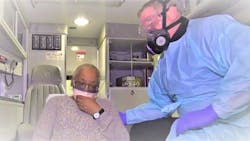OH Bill Would Require COVID-19 Disclosure to Firefighters
Editor's note: Find Firehouse.com's complete coverage of the COVID-19 pandemic here.
COLUMBUS, OH—In reaction to Ohio's first confirmed death from coronavirus, a state lawmaker is urging his colleagues to back a bill that would require hospitals and local boards of health to notify first responders when a patient they've treated is suspected of having a contagious disease.
“We need to make sure our first responders stay healthy and are able to respond to the community's call for service,” said state Rep. Haraz Ghanbari (R., Perrysburg). “In this case, it's my understanding that these first responders did not find out this was a presumptive case from the hospital or department of health and heard about it instead through social media and media reports.”
Springfield Township firefighters who initially transported Mark Wagoner, Sr., to St. Luke's Hospital after a fall were not told by the hospital or the Toledo-Lucas County Health Department that Mr. Wagoner was subsequently treated as a presumptive coronavirus patient.
RELATED:
- OH Firefighters Not Told of Possible Coronavirus Exposure
- Pittsburgh FFs Won't be Notified of Coronavirus Exposure
- OH County Asking for Spare PPE for Firefighters
- IAFC Offering Best Practices in Weekly COVID-19 Webinar
- More PPE, New Precautions for FFs on Front Line of Pandemic
Mr. Wagoner, 76, died on March 18, and his family made the presumptive diagnosis public to alert those who may have come into contact with him. But it was not until the next day that tests confirmed that he was Ohio's first coronavirus fatality.
House Bill 563 is one of a number of measures introduced as part of Ohio's response to the pandemic. As it currently reads, the bill would require such notification in cases of a confirmed diagnosis as well as a presumptive positive for a contagious or infectious disease.
Mr. Ghanbari plans to offer an amendment that would expand the requirement to cases in which there is a “high index of suspicion” of such infection.
“We've worked very hard to protect patient confidentiality,” said Dr. Amy Acton, Ohio’s health director, when asked about the bill.
“We have a full team looking at the policy related to that,” she said. “These are unusual times and an unprecedented situation. We absolutely have to protect our first line of responders.”
She noted patients should also let first responders know about symptoms before they walk in the front door.
Mr. Ghanbari hopes that his fellow lawmakers will pass the bill by a super-majority to allow it to take effect immediately rather than have to wait the customary 90 days.
“Obviously, in times like these we begin to see things that may not have been previously addressed,” Mr. Ghanbari said.
Gary Wolske, president of the Ohio Fraternal Order of Police, called the bill a “great idea.”
“We need to protect our members,” he said.
Under normal circumstances, such a bill might run up against patient privacy protections. But in this case, the U.S. Department of Health and Human Services has waived penalties if a hospital does not protect a coronavirus patient's privacy when it comes to such things as notifying family, friends, and “others Involved in an individual’s care.”
Mr. Ghanbari's bill, in fact, could open a hospital or board of health to civil litigation for failure to provide notification in such a situation.
It remains to be seen how effective such a bill could be in the absence of a specific waiver of privacy protections.
———
©2020 The Blade (Toledo, Ohio)
Visit The Blade (Toledo, Ohio) at www.toledoblade.com
Distributed by Tribune Content Agency, LLC.
